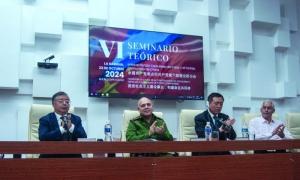
The holding of the 6th Theoretical Seminar between the Communist Parties of Cuba and China, in spite of the exceptional times that the largest of the Antilles is going through, demonstrates the value given to the deep friendship and the historic bi-party relations.
This was conveyed by the member of the Political Bureau and Secretary of Organization of the Central Committee of the Communist Party of Cuba (PCC), Roberto Morales Ojeda, at the opening of the event.
"This new meeting constitutes a special moment for the exchange of ideas and experiences in the purpose of advancing in the demands that, in the spiritual and material order, our own roads to socialism pose to us," he stressed.
Meanwhile, the member of the Political Bureau and the Secretariat of the Central Committee of the Communist Party of China and head of its Publicity Department, Li Shulei, in his opening remarks compared the relationship between the two nations and parties to that of "brothers who overcome difficulties."
Regarding the challenges in common with the Caribbean nation, Li Shulei referred to the Cold War policy of the United States, to which, he stressed, "we must be firm in defending our right to development and jointly advance in equity and social justice."
They agreed on the idea that the seminar is aimed at implementing the consensus reached by the Cuban and Chinese top leaders, Miguel
Díaz-Canel Bermúdez and Xi Jinping, respectively, and, in turn, serve to build a community of shared future and exchange of experiences.
The event, under the slogan To promote the cause of building socialism and building the community of shared future, was held in two commissions, which focused their analysis on the role of the Party in economic development, including attention to non-state forms of management, and on the political work with the new generations, considering the influence of social networks.
In the debate directed to the economic sphere, they highlighted ideas of Marx and Engels on the conception of a socialist system that is still in the process of construction.
It was emphasized that, for the consolidation and progress of this process, the political-ideological unity and the active participation of the people under the leadership of the Party and the legacy of the historical leader of the Cuban Revolution, Fidel Castro Ruz, have been decisive.
On the other hand, the importance of the treatment of the youth from the respective Parties and their relevance and contribution in the use of social networks was stressed, especially in the confrontation of a common problem: the campaigns of subversion and ideological intoxication promoted by U.S. agencies and entities.
He also insisted on avoiding "more of the same" in the ideological treatment of young people, and urged the adoption of creative and intelligent actions to correct the shortcomings.
At the opening of the 6th Theoretical Seminar, a special edition of the newspaper Granma International in Chinese was presented, which is an unprecedented milestone in the history of the weekly, the official organ of the CPC.








